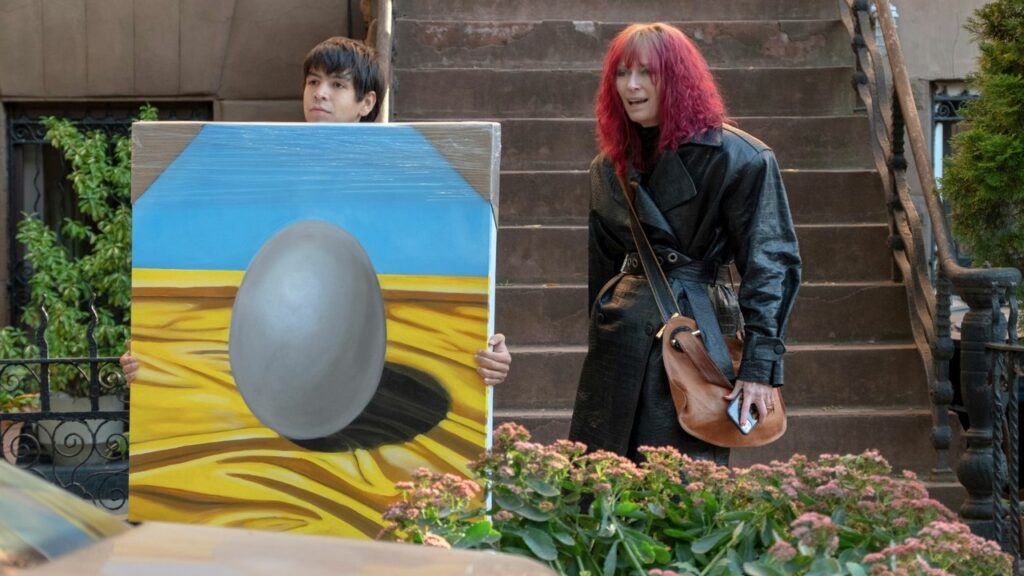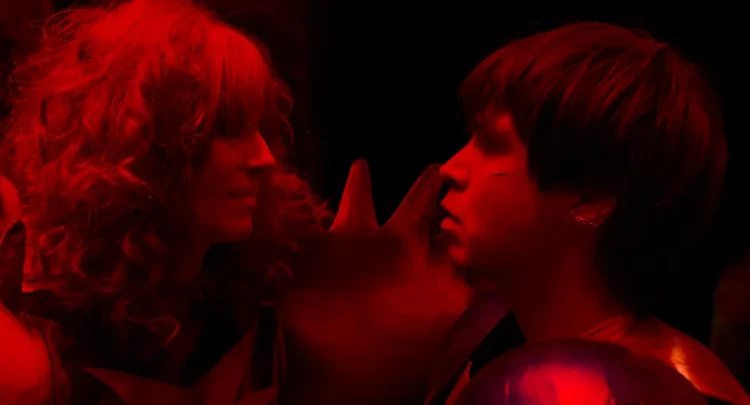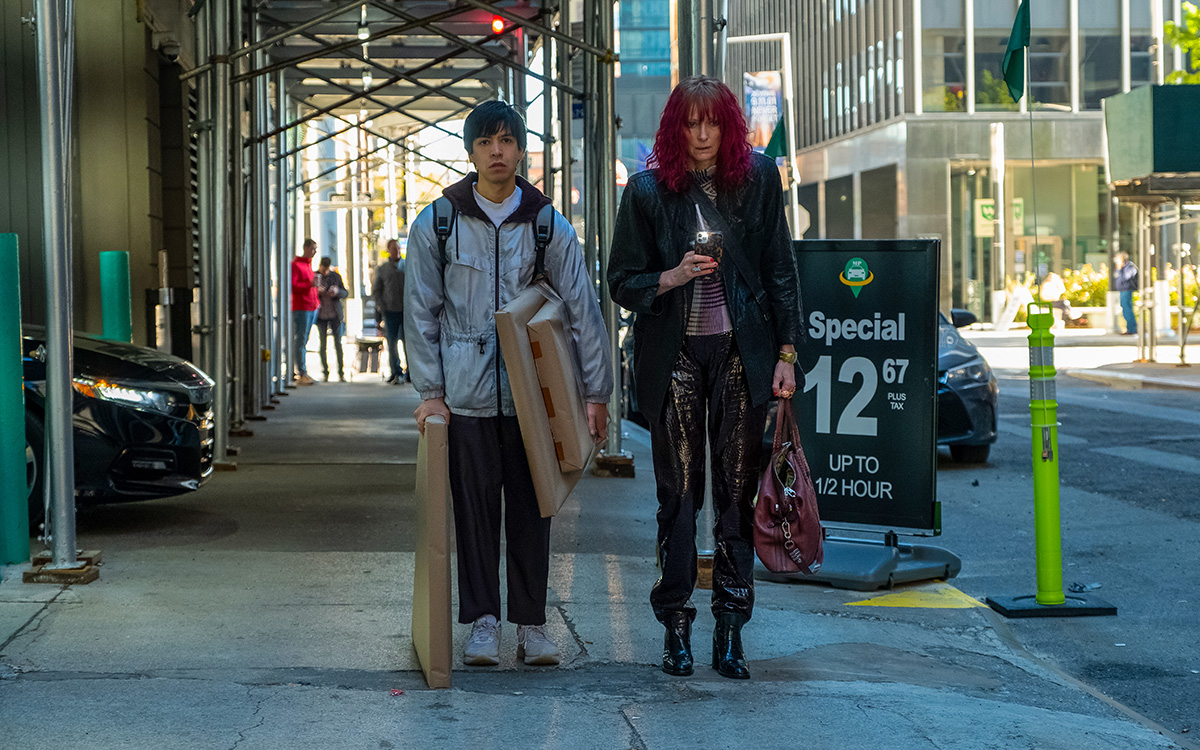Comedian and writer Julio Torres’ directorial debut Problemista, in which its creator plays an El Salvadoran immigrant in New York City pursuing a labyrinthine American Dream, is a potent social critique cloaked in a fantasia of full flower visual imagination. While there have been many substantive immigrant films about the pursuit of a better life in America, Torres puts his own spin on the subject, crafting a confidently stylized debut of genuine substance, playfully absurd yet patently serious in its consideration of a talented outsider struggling and striving against a bureaucratic system to achieve big dreams. Just as Torres’ onscreen counterpart suggests conceptual audacity in pursuit of becoming a future toy designer, the filmmaker reveals himself a director of distinct creative vision.
A sort of surrealist-tinged fairy tale on real life struggles, Torres introduces protagonist Alejandro as a young El Salvadoran son (Logan J. Alarcon-Poucel) to a protective, single artist mother (Catalina Saveedra). Despite her insistence on safety, as a young man (Torres) he nevertheless thrusts himself into the overwhelming void of Manhattan, aspiring to be a Hasbro toy designer—a goal crushed by a rejection and a clock-ticking visa expiration. In desperation, he joins Freeze Corp., a dubious cryogenics company promising future revival. Tasked with overseeing the preservation of frozen artist Bobby Asencio (RZA), who pins his hopes on a future cancer cure, Alejandro’s trajectory hits a snag when he’s fired, endangering his status to stay in the U.S. Amidst this turmoil, Bobby’s flamboyantly eccentric widow, Elizabeth (Tilda Swinton) offering him a potential lifeline.
It’s here the movie achieves liftoff courtesy of the rollicking Swinton, a madcap swirl of exhilarating, exhausting mania. Over an illustrious, nearly 40-year screen career the chameleonic Oscar winner has never played someone so entertainingly high maintenance, for both Torres’ mild-mannered onscreen foil and her moviegoing audience. As a woman-on-the-verge Manhattan art critic turned pariah prone to comically radical temperament swings and caustically high-strung obsessiveness, Swinton’s comedy in chaos is great fun, enlivening a wacky woman of her own terms, determined to become a problem to anyone, anywhere, who dares defy her wickedly demonstrative command.

Her Elizabeth is a force of nature “Karen” with a PhD in tantrums, deploying her fury with unbridled abandon. No customer service warrior (screeching “Human! Human!” from automated menus) is safe from her tempest, whether cloud tech support (“Where are my pictures???”) or otherwise. Her weapon of choice? A scathing, rambling critique, delivered with equal fervor to hapless tech helplines and bewildered restaurant staff alike. “Why are you shouting at me?!” she excoriates an innocent waiter, and anyone unlucky enough to be caught in her crosshairs. When Elizabeth embarks on a quest to secure a prestigious gallery showing for Bobby’s oeuvre of thirteen egg-themed paintings she is woefully unprepared.
These works aren’t exactly high art but they are comedic gold (watching Swinton describe them profoundly is a gas) and possibly a vocational visa sponsorship lifeline for Alejandro, tasked with cataloging each and securing a gallery showing—if only he can navigate the antiquated depths of FileMaker Pro, the software relic Elizabeth clings to with hilarious tenacity in a very funny running gag. Yet within her many befuddled technology illiterate diatribes, which include demands to FedEx CDs for play on her iPad (a jab at Boomers’ limited tech literacy), lies a poignant truth. Both she and Alejandro are misfits in a world that seems to have forgotten or perhaps does not want them: he, adrift without papers; she, a has-been lost in a digital age. It’s this very alignment-in-misalignment that weaves such an oddly endearing alliance.
While hair-trigger Elizabeth dangles potential sponsorship, Alejandro needs roughly six thousand dollars for the daunting application process (Torres mounts a terrific visual in his Charlie Kaufman-esqe, M.C. Escher maze of two steps forward, one back), turning to Craigslist for odd jobs. When sidewalk canvassing for a hair salon doesn’t pan out, he takes a page from the “cleaning boy” personals, the movie gently addressing his sexuality with a pleasing matter-of-factness. Back at his overcrowded apartment, Julio has been forced to rent out his bedroom and despite the goodwill of arty roommate Spray (Spike Einbinder, who needs a movie lead), he’s effectively homeless. And late in the picture, Past Lives star Greta Lee makes the most of a brief cameo as a grudge-holding artist Elizabeth once blackballed.

Deploying magical, surrealist visuals including people who disappear upon visa expiration, a dreamlike, flamboyant Craigslist personification (Larry Owens) and a series of fantasy bits where Elizabeth appears a sort of medieval hydra sparring with an armor clad Alejandro, Torres gives his movie genuine visual invention and a lightness of tone, despite its serious perspective on the hardscrabble life of an immigrant lost a metropolitan jungle, going nowhere while almost no one (other than mom back home in El Salvador) cares.
Beneath Torres’ cheeky audacity and inventive visual flair, the soul of his film resides in the delightful synergy he shares with Swinton. Their collaboration is a throwback to the kind of iconic gay director-theatrical muse duos across eras, reminiscent of Swinton’s early career days when she and British filmmaker Derek Jarman (The Last of England, Caravaggio, Edward II) embarked on a journey rendering nine early films. Swinton, with her ethereally unique (and here, kooky) presence, and Torres, a former SNL scribe turned avant-garde comedy cult figure with credits including My Favorite Shapes and Los Espookys, have found a creative sweet spot that’s part cosmic, part comic. Their artistic union seems boundless.
By the time his unpredictable screenplay arrives at its final destination—300 years in the future—the whimsical picture culminates in an important takeaway: to the vast, indifferent entities of the world, you are invisible—until you become a problem, a name to be reckoned with, propelling you towards your desires. Elizabeth, in a moment of frankness, critiques Julio’s ambition to be a toy designer, questioning the value and appeal of his contributions to a world indifferent to his dreams or visa woes. Yet, by the film’s conclusion, her guidance becomes a direct blueprint for navigating the harsh realities that confront him. This evolution underscores the subtle cleverness of Torres’ creation, a movie that cloaks honest insights beneath stylized idiosyncrasies, revealing a truth about persistence, identity and the power of being seen. That is the sneaky profundity of Torres’s special movie.
3 stars



